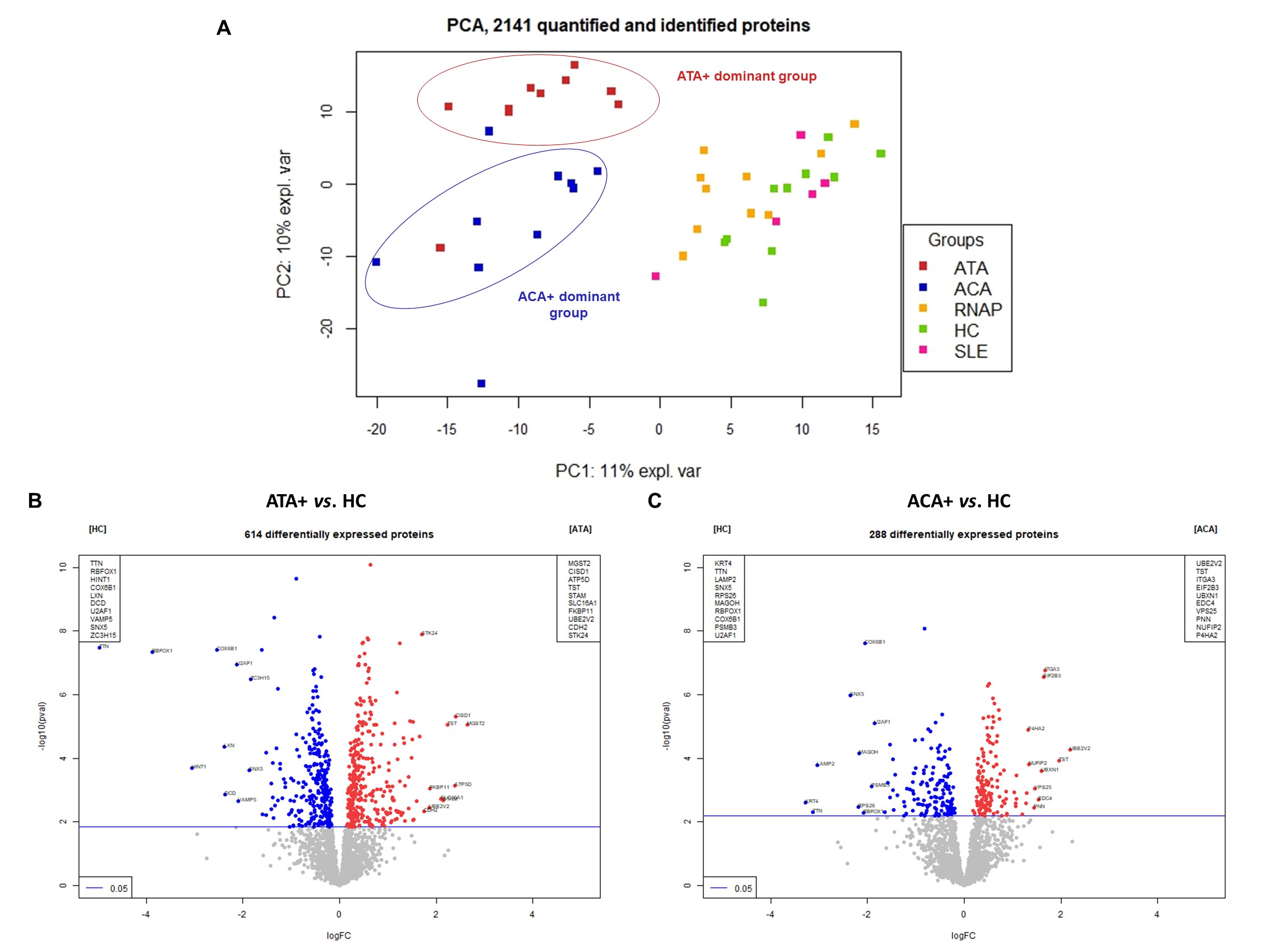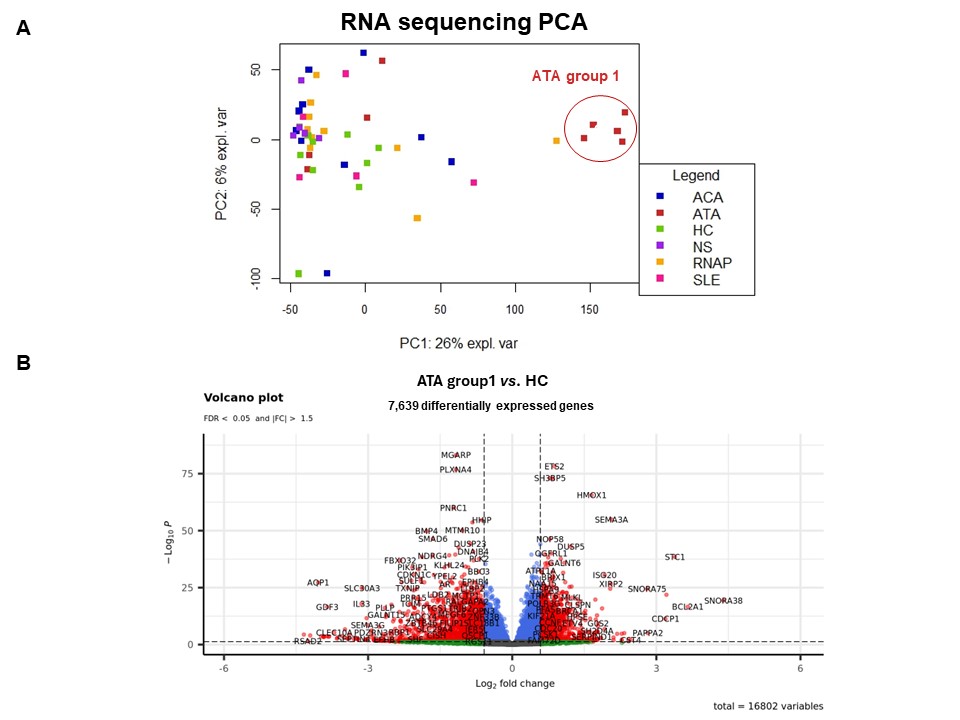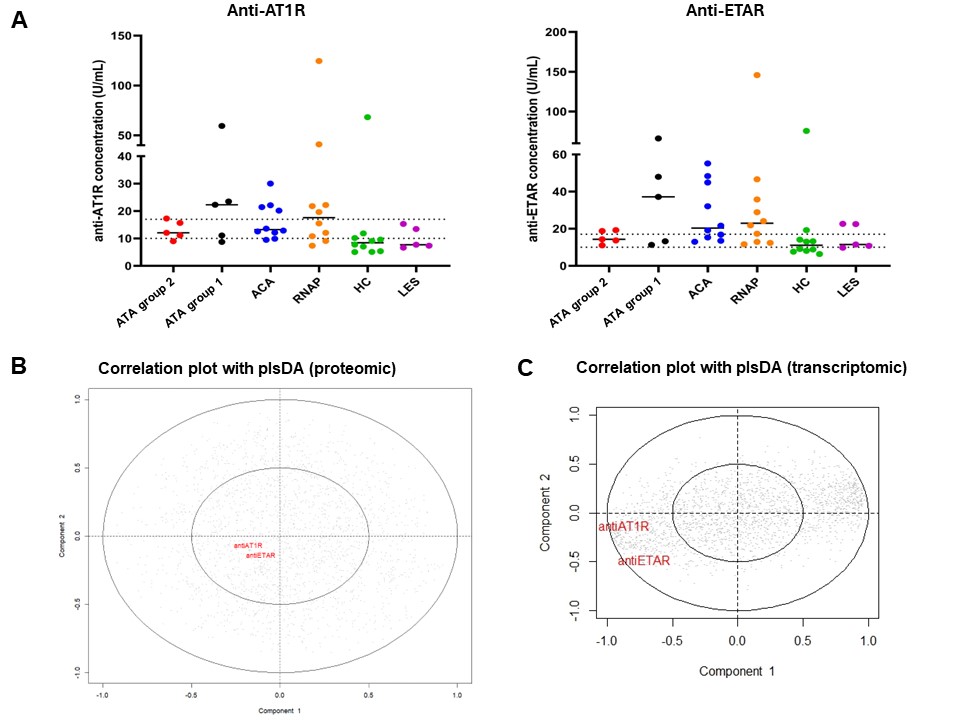Session Information
Date: Sunday, November 17, 2024
Title: Systemic Sclerosis & Related Disorders – Basic Science Poster I
Session Type: Poster Session B
Session Time: 10:30AM-12:30PM
Background/Purpose: Systemic sclerosis (SSc) is a heterogeneous connective tissue disease characterized by autoimmunity, fibrosis and vasculopathy. Antinuclear antibodies (ANA) are strong diagnostic and prognosis biomarkers but their pathogenicity in vasculopathy remains unclear. Functional antibodies (FA) such as angiotensin II type 1 receptor and endothelin-1 type A receptor might be implicated in vasculopathy, in which endothelial cells (EC) are key players.
We aimed to explore the effect of purified IgG from SSc patients from different ANA serogroups on the proteome and transcriptome of EC and analyse the influence of FA on the obtained profiles.
Methods: Human umbilical vein endothelial cells (HUVEC) were cultured in presence of purified IgG from: 10 SSc anti-topoisomerase-I positive patients (ATA+), 10 SSc anticentromere positive patients (ACA+), 10 anti-RNA polymerase III autoantibodies positive patients (RNAP+), 10 healthy controls (HC) and 5 patients with systemic lupus erythematosus (SLE). After 24h, the proteome was analysed using Liquid Chromatography with tandem Mass Spectrometry and Transcriptome by RNA sequencing. FA were quantified and analyzed by enzyme-linked immunosorbent assay in all conditions.
Results: Proteomics identified and quantified 2,141 proteins. Principal component analysis (PCA) showed 3 distinct groups of subjects: a first including mostly ATA+ patients, a second including mostly ACA+ patients and third groups more heterogeneous including RNAP+, SLE patients and HC (Figure 1A). The comparison of HUVEC’s proteome in the presence of purified IgG from ATA+ patients vs HC and ACA+ patients vs HC revealed 614 and 288 differentially expressed proteins respectively (Figure 1B). Proteins overexpressed in ATA+ group were enriched in macromolecule localization and protein binding and overexpressed proteins in ACA+ groups were enriched in RNA and mRNA proteins binding.
Transcriptomic identified 16,802 mRNA. PCA revealed 2 groups of subjects: one homogeneous group composed only by 5 ATA positive patients (ATA group 1) and a second heterogeneous group composed by other ATA positive patients (ATA group 2), ACA, RNAP positive SSc patients, SLE and HC (Figure 2A). There were no differentially expressed genes (DEG) in the comparisons RNAP vs HC and SLE vs HC. The comparison of EC transcriptome in the presence of purified IgG from ATA+ patients vs. HC and ATA group 1 vs. HC revealed 2,425 and 7,639 DEG respectively (Figure 2B). DEG in ATA group 1 were enriched in regulation of cell cycle process and DNA replication.
Finally, the FA levels did not differ among the SSc ANA serogroups. Correlation with Partial least squares-discriminant analysis axes of Omics data suggested that FA did not impact the proteome but might influence EC transcriptome (Figure 3).
Conclusion: IgG from SSc patients influenced EC proteome and transcriptome profiles according to ANA status. FA were present in SSc patients but seemed to have a minimal impact on omics profiles. IgG from ATA+ patients induced EC singular and distinct profiles.
PCA represented HUVEC protein expression according to patients ANA status (A). Volcanoplot representing differential analysis between ATA vs HC (B) and ACA vs HC comparisons (C). ATA: purified IgG from systemic sclerosis anti-topoisomerase-I positive patients; ACA: purified IgG from systemic sclerosis anti-centromere positive patients; RNAP: purified IgG from systemic sclerosis RNA-polymerase III positive patients; SLE: purified IgG from systemic lupus erythematosus patients; HC: purified IgG from healthy controls; HUVEC: Human umbilical vein endothelial cells; PCA: principal component analysis.
Principal component analysis represented HUVEC mRNA expression according to patients ANA status (A). Volcanoplot representing differential analysis between ATA 2 group vs HC (B) ATA: purified IgG from systemic sclerosis anti-topoisomerase-I positive patients; ACA: purified IgG from systemic sclerosis anti-centromere positive patients; RNAP: purified IgG from systemic sclerosis RNA-polymerase III positive patients; SLE: purified IgG from systemic lupus erythematosus patients; HC: purified IgG from healthy controls; HUVEC: Human umbilical vein endothelial cells; PCA: principal component analysis.
Anti-AT1R and anti-ETAR antibodies levels among groups (A). PLDS-DA axes according to FA levels (proteomic). FA levels did not significantly correlate with PLS-DA axes in proteomic (B). PLDS-DA axes according to FA levels (transcriptomic) (C).
SSc: systemic sclerosis; ANA: antinuclear antibodies; EC: endothelial cells; ATA+: anti-topoisomerase-I positive patients; ACA+: anti-centromere positive patients; RNAP: anti-RNApolymerase-III positive patients, FA: functional antibodies, SLE: systemic lupus erythematosus patients; HC: healthy controls, AT1R: angiotensin II type 1 receptor; ETAR: endothelin_1 type A receptor, PLS-DA: Partial Least Squares-Discriminant Analysis.
To cite this abstract in AMA style:
Chepy A, Vivier S, Elhannani A, Bray F, Chauvet C, Figeac M, Guilbert L, HACHULLA E, Rolando C, Dubucquoi S, Launay D, sobanski V. Multi-omics Study of Systemic Sclerosis Immunoglobulins G Effects on Endothelial Cells: A Distinct Profile in Anti-Topoisomerase I Positive Patients [abstract]. Arthritis Rheumatol. 2024; 76 (suppl 9). https://acrabstracts.org/abstract/multi-omics-study-of-systemic-sclerosis-immunoglobulins-g-effects-on-endothelial-cells-a-distinct-profile-in-anti-topoisomerase-i-positive-patients/. Accessed .« Back to ACR Convergence 2024
ACR Meeting Abstracts - https://acrabstracts.org/abstract/multi-omics-study-of-systemic-sclerosis-immunoglobulins-g-effects-on-endothelial-cells-a-distinct-profile-in-anti-topoisomerase-i-positive-patients/



